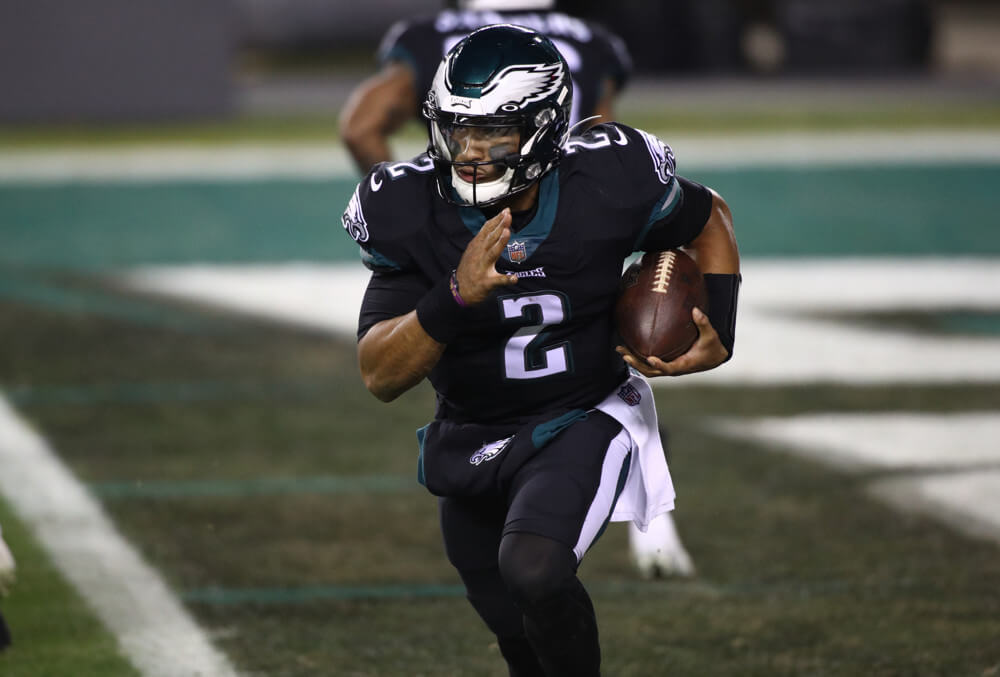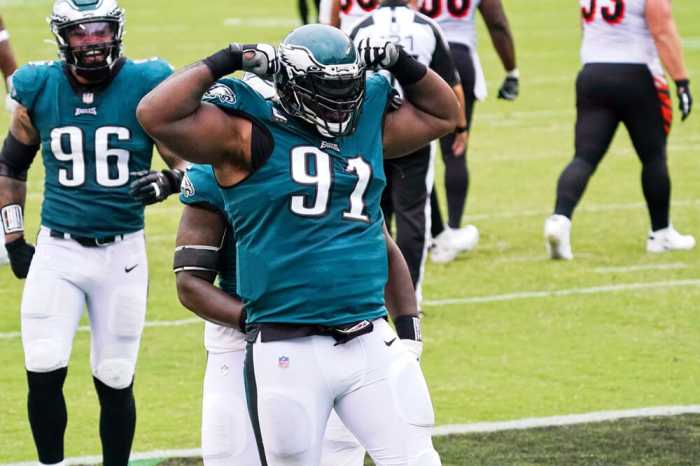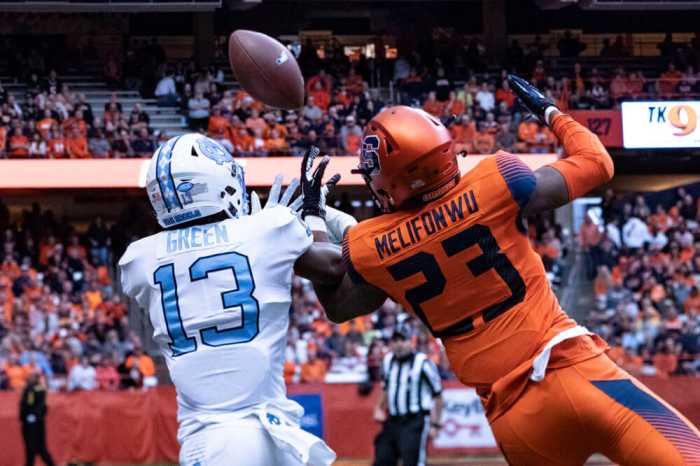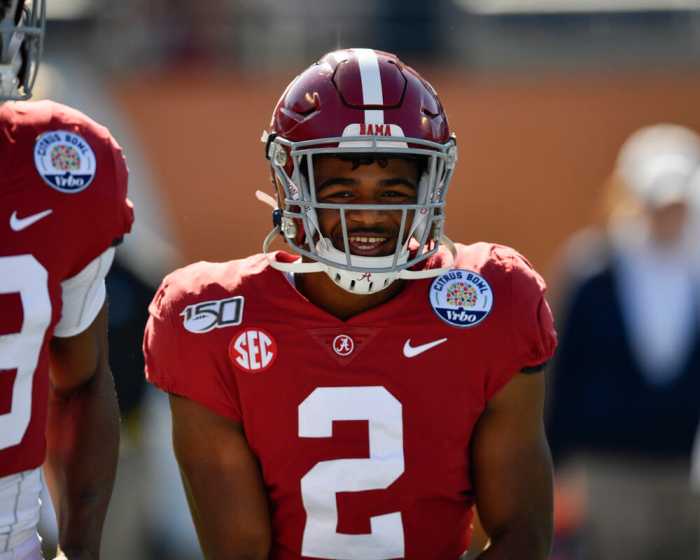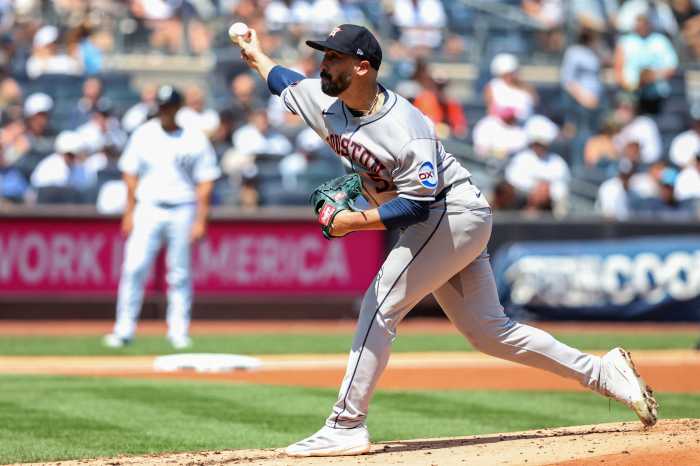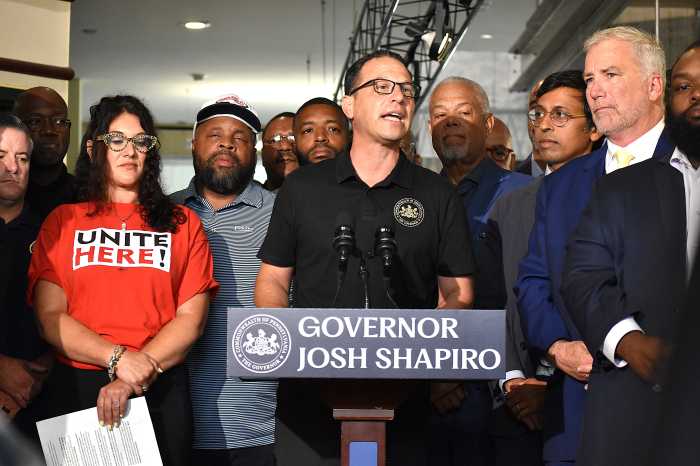The 1st round of the 2021 NFL draft was a major success for the Philadelphia Eagles. They selected Heisman Trophy winner, DeVonta Smith, to act as a new WR1 for Jalen Hurts. The pick was met with nearly universal praise by fans and draft experts, but there is a chance this selection will become synonymous with the Eagle’s drafting woes…and that’s a feeling that likely haunted Howie Roseman for weeks leading up to the Draft, but not for the reasons you think. It’s not so much who the Eagles drafted, as much as it is who they didn’t.
The Eagles had an opportunity to take a top QB prospect in Justin Fields but opted to select a wide receiver instead. The Ohio State standout surprisingly fell outside the top 10 and into the laps of the Chicago Bears who desperately needed a QB. The decision to pass on Fields may be a defining moment in the future of this franchise…for one of two reasons.
We have to remember that the Eagles were coming off of a tumultuous 2020 campaign that ended with the exile of Carson Wentz. After selecting Jalen Hurts in the second round just one year beforehand, the Eagles imploded and were forced to kickstart a new era due to a chain-reaction of utter chaos.
Hurts, innocent in all of this, showed plenty of promise as a rookie. That didn’t stop the critics from screaming from the rooftops and the rumors from swirling. Would Howie Roseman do the unthinkable again? Was he really sold on Jalen Hurts?
His ultimate test of trust came in a way that not many people expected. Justin Fields fell gracefully into the lap of the oft-criticized Eagles GM, but would he flinch?
The conversation over Fields should start by mentioning that he is a black QB. Unfortunately, Football is not colorblind and there has been an element of racism tied to the evaluation of QB prospects in the past. Deshaun Watson and Lamar Jackson were notably subjected to a similar narrative as “first-read, athletic QB’s”.
The NFL was wrong with Watson and Jackson. I believe Fields will prove the NFL was wrong once again. The Ohio State alum possesses an incredible combination of elite arm strength and pinpoint deep ball accuracy, a match made in heaven. The perception that Fields did not often pass beyond his first read could have been extended to Trevor Lawrence, Zach Wilson, and Mac Jones.
When I evaluate quarterback play, I do not believe throwing beyond your first read is a useful metric. I am much more concerned with how often the QB made the correct throw. When I studied Fields, I saw countless examples of him making the right decision of where to throw the ball. He threw with anticipation, accuracy, and trust in his teammates. Yet Fields received the most criticism by far for not throwing beyond his first read. Meanwhile, Trevor Lawrence played in an offense predicated on throws near the line of scrimmage with RPO concepts isolating his reads. Throwing beyond your first read is a common issue for most QB’s as they transition from college to the NFL. I doubt any issues the Eagles had with Fields were related to race, but I wanted to give a full scope of how Fields is evaluated.
This does not mean Fields is a perfect prospect, many of his issues extend from him being the best player on the field (pun intended). The supremely talented Fields often elected to make throws that were more difficult by betting on his arm talent. To no one’s surprise, this worked very well in college because Justin Fields was often the best player in the game. This includes a dominant performance against Clemson where Fields outshined Trevor Lawrence. It is likely that there will be an adjustment period for Fields to get acclimated to the speed of the NFL which is completely normal.
Fields received criticism for an up and down 2020 season which needs to be put in the correct context. He faced the most difficult defensive schedule of any QB drafted in the last 10 years. Trevor Lawrence and Zach Wilson played a significantly lower level of competition which provides a greater depth of understanding to any struggles Fields had. Even though he faced a historically difficult schedule, Fields completed over 70% of his passes and threw for 22 touchdowns to just 6 interceptions in a shortened season.
The 2019 Heisman Trophy Finalist can pick apart man coverage defenses with his arm or legs, Fields is 6’3, 230, and runs a 40-yard dash in the 4.4’s. This will allow him to hang in the pocket to make difficult throws or break contain to convert 3rd downs. Fields’ major flaw is in the quick passing game, he displays timing issues that I believe are easily correctable. These issues are not prohibitive to early success in the NFL and can be fixed through coaching. The former 5-star recruit has all the traits, tools, and talent to become a dominant QB at the next level.
For Howie Roseman to not pull the trigger on such a tantalizing prospect, knowing that he has a bevy of first-round picks next year anyway, was impressive. He showed little resilience when Jalen Hurts was on the board in the second round last year and after the franchise took a significant step backward in 2020, there’s no questioning that he would’ve considered repeating history in a bid to right those wrongs. If there was any doubt that Jalen Hurts could be the face of the franchise moving forward, that would have been the moment we knew. The moment passed by silently, and Howie Roseman brought in a weapon Hurts is all-too familiar with instead, doubling down on the Oklahoma product.
Ultimately, the Eagles are betting on Jalen Hurts and trying to build talent around him to succeed in 2021. I like Jalen Hurts, but it is clear that the Eagles had a chance to select a more talented QB, which could come back to haunt this franchise. Passing on Fields may be a franchise-altering mistake. The Eagles are banking on the fact that giving up on Hurts after a season of flashes would be just as destructive, having learned their lessons from the Carson Wentz saga.
Photo by Kyle Ross/Icon Sportswire

